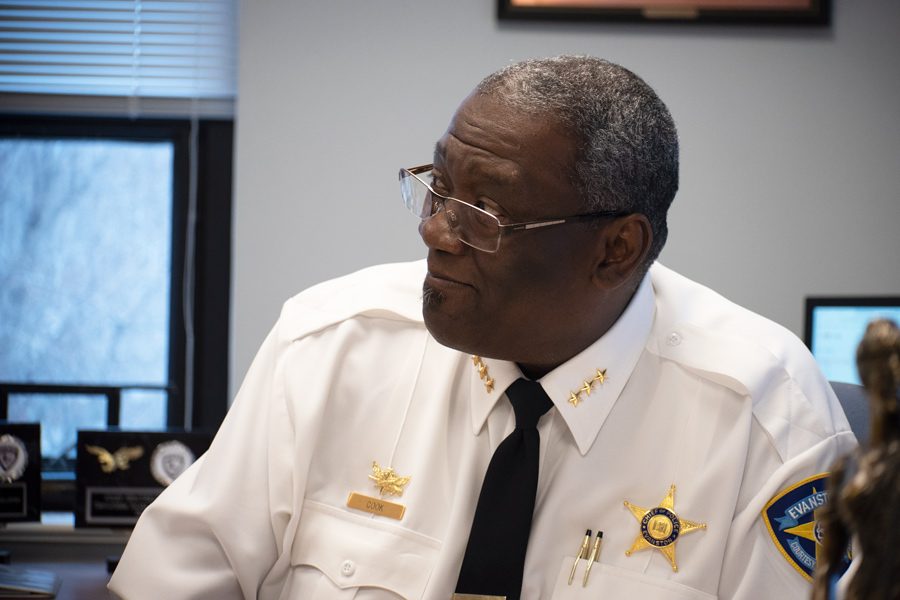Local academics, Evanston officials discuss race and policing in virtual roundtable
Daily file photo by Christopher Vasquez
EPD police chief Demitrous Cook. At a virtual roundtable discussion on race and policing in Evanston, Cook said he wants to continue to find ways for EPD to improve its relationship with the city, especially its black residents.
June 16, 2020
Panelists from Evanston, Northwestern and Chicago discussed issues surrounding the state of race and policing in Evanston during a virtual conversation hosted by the city clerk’s office on Tuesday.
The panel was organized in the wake of national protests following the death of George Floyd, who was killed by Minneapolis police officers in May. The conversations come amid national discussions about police abolition, including significant proposed cuts to funding for police departments in cities like Baltimore. Additionally, Minneapolis City Council recently announced its intent to disband the Minneapolis Police Department and create a community-led public safety system.
In Evanston, local activists have called on Evanston City Council to defund or reevaluate funding for the Evanston Police Department and invest in support for the city’s black residents. At NU, students are pushing for the university to divest from EPD, Chicago Police Department and Northwestern University Police Department.
Panelist Christopher Harris, a postdoctoral fellow in NU’s African American studies department, said the discussion about institutional racism and the impact of white supremacy on policing should remain central to reform moving forward. He also said it’s essential that activists’ calls for police abolition shouldn’t become diluted.
However, Evanston police chief Demitrous Cook said he was concerned about the impact over-generalizations could have on these conversations. Cook said he wanted to continue to find ways for EPD to improve its relationships with the city, especially its black residents.
“We have to be careful with how we define race,” Cook said. “A lot of the things that are unstructured in law enforcement are not all about race… You really have to be careful with how you define a whole institution.”
Cook said while policing strategies have come under fire throughout the nation, the department has eliminated stop-and-frisk and does not permit chokeholds. EPD only allows no-knock warrants when granted by a judge, he added, and requires all use-of-force incidents to be reported. However, officers also participate in force science training, a practice that prepares law enforcement officers for situations where force might be needed. It has been condemned by many activist groups, who say it perpetuates police brutality.
While he understands outside frustrations, Cook said as a police chief he’s had different experiences with law enforcement than most citizens — which informs his push for systemic reform.
However, Ameya Pawar, a former Chicago Alderman, said the system Cook refers to may have flaws that can’t be fixed. Pawar said from his experiences with CPD, officers often protect their own, and groups such as police unions frequently prevent major changes.
Because of this, Pawar said it’s important for all local governments — including Evanston’s — to examine the ways they support police departments through legislature and funding.
“There is a cultural issue within the profession that demands loyalty in ways that makes it dangerous for the public at times,” Pawar said. “That culture needs to be addressed.”
The event, which was initially open to the public for questions through Zoom and streamed on Facebook Live, was Zoombombed after about 30 minutes. One or more people joined the meeting and yelled racial slurs at panelists, condemned the Black Lives Matter movement and called for the “slaughter” of all black people.
Harris said the incident, while harmful and disappointing, also emphasizes the necessity of similar conversations nationwide.
“It reinforces the need for us to name things as they are, and that was violent,” Harris said. “It was anti-black. It was… entitlement to the sanctity of our space and our ability to be in community and reflect in serious ways about the way the institutions and the structures that we live in and under do harm.”
Email: [email protected]
Twitter: @jacobnfulton1
Related stories:
— Students call on University to divest from police forces and invest in Black communities
— University administrators commit to racial and social justice policies in the wake of Black Lives Matter


